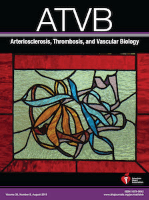
ARTERIOSCLEROSIS THROMBOSIS AND VASCULAR BIOLOGY
Scope & Guideline
Pioneering insights into thrombosis and vascular disorders.
Introduction
Aims and Scopes
- Vascular Biology and Pathophysiology:
Research focused on the cellular and molecular mechanisms underlying vascular health and disease, including endothelial function, smooth muscle cell dynamics, and the role of vascular inflammation in atherogenesis. - Thrombosis and Hemostasis:
Investigations into the mechanisms of blood clot formation and resolution, including studies on platelets, coagulation factors, and the impact of various pathological conditions on thrombotic processes. - Atherosclerosis Mechanisms:
Studies elucidating the pathophysiology of atherosclerosis, including lipid metabolism, inflammatory processes, and the role of immune cells in plaque formation and stability. - Genetic and Environmental Risk Factors:
Exploration of genetic determinants and environmental influences on cardiovascular disease risk, with a focus on identifying novel biomarkers and therapeutic targets. - Innovative Therapeutic Strategies:
Research on new therapeutic approaches for cardiovascular diseases, including drug development, gene therapy, and the use of advanced biomaterials for vascular repair. - Translational Research:
Bridging basic science with clinical applications, aiming to translate findings from laboratory research into effective treatments and interventions for cardiovascular diseases.
Trending and Emerging
- Precision Medicine Approaches:
An increasing number of studies focus on personalized medicine, utilizing genetic and molecular profiling to tailor interventions for cardiovascular diseases, reflecting a broader trend in healthcare. - Role of the Microbiome:
Research exploring the influence of gut microbiota on cardiovascular health is gaining traction, with studies linking microbial metabolites to vascular inflammation and atherosclerosis. - Immunometabolism in Cardiovascular Disease:
The intersection of immune responses and metabolic processes in vascular disease is emerging as a critical area of research, highlighting the role of inflammation in atherosclerosis and thrombosis. - Innovative Imaging and Biomarker Technologies:
Advancements in imaging techniques and biomarker discovery are increasingly featured, enabling more precise monitoring of vascular health and disease progression. - Novel Therapeutic Modalities:
There is a rising interest in novel therapeutic strategies, including the use of nanoparticles, CRISPR technology, and RNA-based therapies, aimed at addressing vascular disease at a molecular level. - Cellular Plasticity and Regenerative Medicine:
Research on the plasticity of vascular cells and their potential for regeneration and repair is becoming more prominent, particularly in the context of stem cell therapies and tissue engineering.
Declining or Waning
- Traditional Risk Factor Studies:
Research focusing solely on conventional cardiovascular risk factors (e.g., hypertension, cholesterol levels) has decreased as the field moves towards more complex, multifactorial models of disease. - Basic Animal Models:
There is a noticeable reduction in studies utilizing traditional animal models without incorporating modern techniques such as genetic manipulation or advanced imaging, as researchers seek more relevant and translationally applicable models. - Single-Factor Interventions:
Research that examines the effects of single interventions on vascular health, without considering the multifaceted interactions present in human health, is becoming less prevalent as the complexity of cardiovascular disease is better appreciated. - Epidemiological Studies with Limited Scope:
Epidemiological studies that focus narrowly on specific populations without integrating broader systemic factors are declining, as there is a push for more comprehensive approaches to understanding cardiovascular health across diverse populations.
Similar Journals
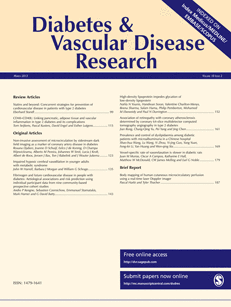
Diabetes & Vascular Disease Research
Transforming research into breakthroughs for vascular health.Diabetes & Vascular Disease Research is a leading academic journal dedicated to advancing the understanding and treatment of cardiovascular and metabolic diseases, particularly diabetes. Published by SAGE Publications Ltd in the United Kingdom, this journal serves as a key resource for researchers, clinicians, and students seeking to explore the intricate relationship between diabetes and vascular health. With an impressive Impact Factor and ranked in the Q2 quartile in prominent categories such as Cardiology, Endocrinology, and Internal Medicine, the journal provides a platform for high-quality, peer-reviewed research. Covering a broad range of topics from pathophysiology to therapeutic innovations, Diabetes & Vascular Disease Research plays a vital role in shaping contemporary discourse in the field. With contributions from leading experts and a commitment to disseminating valuable findings, this journal is a must-read for anyone involved in the fight against vascular complications arising from diabetes.

Indian Journal of Vascular and Endovascular Surgery
Innovating Vascular Solutions for Better OutcomesThe Indian Journal of Vascular and Endovascular Surgery, published by Wolters Kluwer Medknow Publications, serves as a premier platform dedicated to advancing research and clinical practices in the fields of vascular and endovascular surgery. With an E-ISSN of 2394-0999 and a commitment to open access since 2015, this journal provides invaluable insights to researchers, professionals, and students alike, fostering a collaborative environment for the dissemination of knowledge. By focusing on innovative techniques, case studies, and systematic reviews, the journal plays a vital role in enhancing clinical outcomes and promoting evidence-based practices within the vascular community. Its commitment to high-quality research and accessibility positions it as an essential resource in the landscape of surgical literature, encouraging further exploration and collaboration within this critical area of healthcare.

Nature Cardiovascular Research
Advancing cardiovascular knowledge for a healthier tomorrow.Nature Cardiovascular Research, published by SpringerNature in Germany, stands as a premier journal dedicated to advancing the field of cardiovascular sciences. With an impressive 2023 categorization in the Q1 quartile across multiple disciplines—including Biochemistry, Genetics and Molecular Biology, Cardiology, and Medicine—this journal uniquely positions itself as a leading resource for pioneering research and innovative findings. Although currently not open access, it provides a rich repository of peer-reviewed articles that contribute directly to the evolving landscape of cardiovascular medicine. The journal aims to bridge the knowledge gap between basic science and clinical application, catering to researchers, healthcare professionals, and students alike who are immersed in the complexities of cardiovascular health. With robust Scopus rankings in key categories, Nature Cardiovascular Research is poised to shape future directions in the field, helping to foster a deeper understanding of cardiovascular diseases and their underlying mechanisms. Explore the latest research and be part of the conversation in one of the most impactful scientific domains.
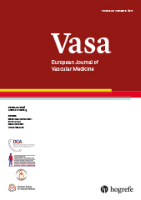
Vasa-European Journal of Vascular Medicine
Empowering Vascular Health with Cutting-Edge ScholarshipVasa - European Journal of Vascular Medicine is a leading peer-reviewed journal dedicated to advancing the field of vascular medicine, published by HOGREFE AG in Switzerland. With a proud history dating back to 1972, this journal serves as a critical platform for researchers, clinicians, and healthcare professionals committed to enhancing knowledge and practice related to cardiovascular health and vascular disorders. Holding a notable Q2 ranking in the cardiology and cardiovascular medicine category, Vasa’s scholarly contributions reflect high-quality research and innovative insights that drive clinical applications. The journal provides essential access to original articles, reviews, and case studies, fostering a vibrant exchange of ideas within the vascular medicine community. Its Scopus rank of #159 out of 387 further underscores its impact, placing it confidently in the 59th percentile among its peers. Vasa is synonymous with rigorous academic standards and relevance, making it an invaluable resource for anyone seeking to stay at the forefront of vascular research and its clinical implications.

GENESIS
Fostering Interdisciplinary Insights in BiologyGENESIS is a renowned journal dedicated to advancing the fields of Cell Biology, Endocrinology, Genetics, and Miscellaneous Medicine, published by WILEY. With an ISSN of 1526-954X and an E-ISSN of 1526-968X, this journal has established a significant presence in academic publishing since its inception in 2000. Positioned within the Q3 category for Cell Biology and Q2 categories for Endocrinology, Genetics, and Medicine in the 2023 rankings, GENESIS offers an interdisciplinary platform that fosters pioneering research and innovation. Additionally, the journal provides options for Open Access, ensuring that vital discoveries are accessible to a broader audience. Researchers, professionals, and students alike will find valuable insights and cutting-edge studies within its pages, making GENESIS a crucial resource for anyone invested in the biological sciences.
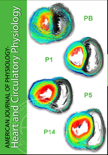
AMERICAN JOURNAL OF PHYSIOLOGY-HEART AND CIRCULATORY PHYSIOLOGY
Elevating understanding of heart dynamics and circulation.AMERICAN JOURNAL OF PHYSIOLOGY-HEART AND CIRCULATORY PHYSIOLOGY, published by the American Physiological Society, is a premier journal dedicated to advancing the understanding of cardiovascular physiology. With an ISSN of 0363-6135 and an E-ISSN of 1522-1539, this esteemed journal has been a vital resource since its inception in 1977, and continues to publish cutting-edge research that shapes the fields of cardiology and physiology. Recognized as a Q1 journal in multiple categories, it ranks impressively within the top tier of its fields, including a notable 18th percentile rank in Physiology (medical). The journal’s impact factor and extensive reach in the academic community affirm its significance in promoting innovative studies and insights. While it does not offer open access options, the journal remains accessible through institutional subscriptions, making it an essential tool for researchers, professionals, and students alike, who are keen to stay abreast of the latest developments in heart and circulatory physiology. For further information, the journal is based in the United States at 6120 Executive Blvd, Suite 600, Rockville, MD 20852. As a cornerstone of cardiovascular research, it invites contributions that push the boundaries of knowledge and enhance clinical practice.

Annals of Vascular Diseases
Transforming Vascular Care Through Open Access KnowledgeAnnals of Vascular Diseases is a leading international journal dedicated to the comprehensive exploration of vascular pathology, aimed at advancing knowledge in the field through innovative research and insightful reviews. Published by the ANNALS VASCULAR DISEASES EDITORIAL OFFICE and available in both print (ISSN: 1881-641X) and electronic format (E-ISSN: 1881-6428), this journal has embraced Open Access since 2017, facilitating wider dissemination and accessibility of vital research findings. With its focus on clinical and experimental studies relating to vascular diseases, the journal serves as a crucial platform for researchers, medical professionals, and students who seek to stay at the forefront of clinical advancements. By fostering collaboration and sharing knowledge, Annals of Vascular Diseases plays a significant role in shaping the future of vascular research and treatment strategies worldwide.

Journal of Atherosclerosis and Thrombosis
Bridging research and practice in cardiovascular health.Journal of Atherosclerosis and Thrombosis is a leading academic publication dedicated to advancing research in the fields of cardiovascular medicine, biochemistry, and internal medicine. Published by the Japan Atherosclerosis Society, this esteemed journal operates from its headquarters in Tokyo, Japan, and has been a vital resource in its area since its inception in 1994. With its robust impact in Cardiology and Cardiovascular Medicine, ranking in the top quartile (Q1) as of 2023, and a commendable standing in Internal Medicine and Biochemistry, the journal fosters an environment of innovation and discovery, showcasing significant studies and advancements that shape clinical practices and therapeutic approaches. Though not an open-access publication, it offers a wealth of insights to researchers, professionals, and students seeking to deepen their understanding of atherosclerosis and thrombosis. By continually featuring high-quality articles, the Journal of Atherosclerosis and Thrombosis plays an essential role in bridging the gap between research and practice, facilitating critical conversations that influence the future of cardiovascular health.

CLINICAL HEMORHEOLOGY AND MICROCIRCULATION
Connecting Theory and Practice in Cardiovascular ResearchClinical Hemorheology and Microcirculation, published by IOS Press, is a distinguished journal dedicated to advancing the scientific understanding of blood flow mechanics and microcirculatory phenomena. Since its inception in 1991, the journal has been pivotal in bridging the fields of cardiology, hematology, and physiology, as evidenced by its placement in the Q3 quartile across several categories in 2023. Positioned in the vibrant academic landscape of the Netherlands, Clinical Hemorheology and Microcirculation offers valuable insights to researchers and practitioners alike, enriching their knowledge and fostering innovation in clinical practices. With an ISSN of 1386-0291 and an E-ISSN of 1875-8622, the journal serves as a vital platform for disseminating high-quality research and reviews that explore the intricate dynamics of blood viscosity and microvascular function, essential to both health and disease. As readers delve into the journal, they will access rigorous studies that not only enhance theoretical understanding but also pave the way for potential clinical applications, making it a crucial resource for those invested in the future of cardiovascular and hematological research.
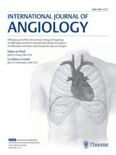
International Journal of Angiology
Connecting researchers and practitioners in cardiovascular health.Welcome to the International Journal of Angiology, a distinguished publication dedicated to advancing the field of cardiology and cardiovascular medicine. Published by THIEME MEDICAL PUBL INC, this journal plays a crucial role in disseminating innovative research and clinical insights from 1992 through 2024, serving as a vital resource for researchers, healthcare professionals, and students alike. With an ISSN of 1061-1711 and an E-ISSN of 1615-5939, the journal currently holds a respectable Q4 ranking in the cardiology field, reflecting its commitment to quality and relevance. Although it operates under a traditional access model, the journal ensures that critical research findings are shared with a broad audience, fostering collaboration and knowledge exchange. By exploring current trends, diagnostic techniques, and treatment modalities in angiology, the International Journal of Angiology remains an essential platform for those dedicated to improving cardiovascular health around the globe.